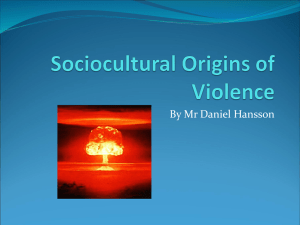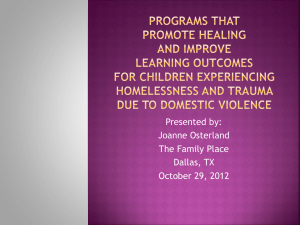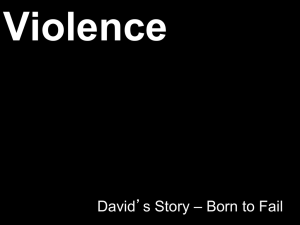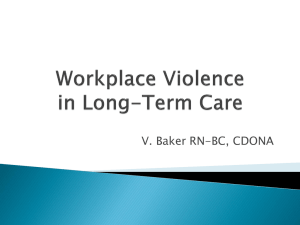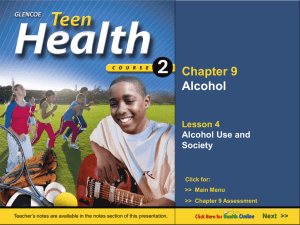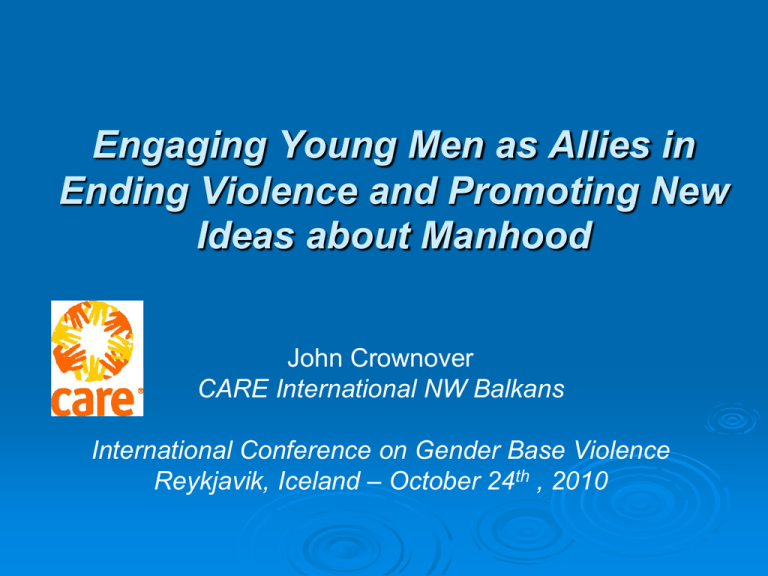
Engaging Young Men as Allies in
Ending Violence and Promoting New
Ideas about Manhood
John Crownover
CARE International NW Balkans
International Conference on Gender Base Violence
Reykjavik, Iceland – October 24th , 2010
YMI is focused on addressing
social norms with adolescent
boys around masculinity and its
effects on gender norms and
violence.
Background
•Legacy of Conflict and War in the
former Yugoslavia – 1991 – 2001
•Gender base violence as a tool of war
•Strengthening of patriarchal and
traditional social norms
•Nationalism and political violence
•Rigid constructions of what it means
to be a man
Why work with young men
•
•
•
•
•
Young men are both victims and perpetrators of
violence;
Young men have certain health vulnerabilities and risks
that impact their development;
Confront stereotypes about young men;
Promoting gender equity and gender equitable
relationships has benefits for both young men and
women;
Gain a better understanding of masculinity (ies) and its
impact on young men
Partnerships
CARE supports and build capacity of local actors
YMI involved 5 youth work oriented
organisations, Women’s rights training NGO,
local researchers and one lifestyle and social
marketing organisation
Lack of youth services and centers (poor youth
infrastructure) drove intervention to be school
based partnership (10 schools involved – 5
intervention and 5 control)
Ministry for Education and Ministry for Youth and
Sport
Approach
YMI
uses a gender and developmental
perspective which seeks to combine the
lens of gender and developmental
psychology to better understand genderd
behavior in adolescents over their life
cycle.
Participatory Learning in Action (PLA)
•There is little available
research that explores what it
means to be a young man in
the Balkans, particularly with
regards to gender-related
norms and attitudes about
violence. Much of the
project's understanding of
these issues is drawn from a
(PLA) exercise conducted
with young men in April 2007,
as well as from the
experience and insights of
project team members in four
countries.
PLA – Exploring Dimensions of Masculinity and Violence
A few key PLA insights from young men in Bosnia and
Herzegovina, Croatia, Montenegro and Serbia provided
important background for YMI's interventions and
evaluation
Young men identified some of the characteristics of
“ideal” men, including: physical strength, protection of
honor, defending strong opinions, strong character,
being successful in everything, participation in masculine
activities (sports and drinking), sexual virility, lack of
cowardice (i.e., not acting like a woman, in their words),
being heterosexual.
PLA – Exploring Dimensions of Masculinity and Violence
Young men identified home and school as the two strongest
social spaces influencing masculinity across the Balkans.
Within these spaces, young men are strongly influenced by
parents, siblings and peers groups. Peers are particularly
important in shaping a young man’s sense of the social “dos
and don’ts” of being a man.
Young men listed and categorized types of violence into
physical, psychological (emotional) and sexual violence.
Violence among peers seemed to be the most pervasive, with
most violence of this nature occurring at school, in the street,
or in other public places. Many young men expect their peers
to join in fights to maintain allegiance to the individual or
group. Violence against sexual minorities, especially gay men,
was widely mentioned with general feelings that the victims
deserved the violence.
Capacity Building and Youth
Work
• A staff
development training program developed for the
youth workers from partners organisation;
•Many staff, both women and men had traditional views
around gender and masculinity…process of self reflection
took time
Regional Young Men Forum
• A regional
forum of 20 young men, mainly those who
were involved in the PLA and wanted to continue to be
active was developed;
•Training and personal development supported;
•Became important peer catalysts and voluntary workers
in the youth organisations;
Lifestyle Campaign and Educational
Programme Development
Regional
young men forum (secondary
school students) played important role
Different professional working with the
youth to construct campaign
Adapted an educational program from
Brazil in working with young men and field
tested (program muski )
Budi Musko – Be a Man
A
lifestyle school based campaign
developed
Campaigned focused on social norms
around masculinity as it related to
violence, health lifestyles and gender
norms
Enlisted positive celebrities to help with
kick off
Baseline and Endline
• Program
focused on 9 technical schools with a predominant
male student population (randomly selected intervention and
control);
•The evaluation uses a self-administered survey with young men
aged 15-19 enrolled (as of February 2009) in Grades 1 and 2 at
the nine schools. The intervention straddled two academic
years, and continued to engage with this same group of young
men as they move into Grades 2 and 3 in September 2009. Data
collection occurs at two points – baseline (February-March 2009)
and post-intervention, or endline (May - June 2010) with a cross
section of young men from the same grades (with approximately
equal number of young men selected from each of the two
grades) at the same schools.
Baseline Highlights
Violent behaviors in the past 3 months
Been part of a violent act as part of a group of young men or
gang
28%
Participated in verbal abuse or threats towards someone
you though was gay or overly feminine
21%
Participated in hitting or beating someone you thought was
gay or overly feminine
13%
Pushed another young man or boy
54%
Kicked or punched another young man or boy
51%
Humiliated another young man or boy
53%
0%
10%
20%
30%
40%
50%
60%
Gender Norms – Gender Equitable Men Scale (GEM)
Gender Equitable Men Scale Score
(1= most Gender Equitable, 0 = least gender equitable)
0.54
Agreed with the statement:
%
It is the man who decides when and how to have sex
Men need sex more than women do
A man needs other women, even if things with his wife are fine
There are times when a woman deserves to be slapped.
A woman should tolerate violence in order to keep her family together.
It is okay for a man to hit his wife if she will not (does not want to) have sex with
him.
Changing diapers, giving kids a bath, and feeding the kids are the mother’s
responsibility.
A woman’s most important role is to take care of her home and cook for her family.
If someone insults me, I will defend my honor, even if it means using violence.
I would never have a gay friend.
It disgusts me when I see a man acting like a woman
72%
76%
46%
46%
25%
10%
76%
71%
85%
79%
93%
School based interventions
•Workshops organised on a voluntary basis covering
topics like sexual health, conflict, gender, honor,
emotional health (a series of 20 workshops done over a
period of 10 sessions)
•Workshops done both within school and in spaces of
youth organisations
•Campaign workshops open to all students (male and
female) included visual arts (comic strips, video , music)
•School events organised on different themes
Conclusions
Challenging social norms around gender and
violence is vital;
Providing a space for young men to explore
issues manhood;
Young males valued the opportunity to confront
stereotypes about themselves and to be allies
with girls and women on promoting human rights
issues;
MENENGAGE ALLIANCE
MenEngage Alliance as a global network to promote
exchange, dialogue, field-building, collective advocacy to
promote non-violent, gender-equitable manhood
Specific projects on Men, Masculinities and Sexual
Exploitation; Men and GBV Prevention in PostConflict Settings
Working in partnership with Women Rights and
Feminist Movements
Joint advocacy
Information sharing, building leadership and skills




